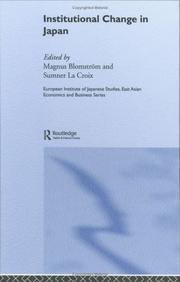| Listing 1 - 10 of 12 | << page >> |
Sort by
|
Book
ISBN: 022659212X Year: 2019 Publisher: Chicago : University of Chicago Press,
Abstract | Keywords | Export | Availability | Bookmark
 Loading...
Loading...Choose an application
- Reference Manager
- EndNote
- RefWorks (Direct export to RefWorks)
Relative to the other habited places on our planet, Hawai'i has a very short history. The Hawaiian archipelago was the last major land area on the planet to be settled, with Polynesians making the long voyage just under a millennium ago. Our understanding of the social, political, and economic changes that have unfolded since has been limited until recently by how little we knew about the first five centuries of settlement. Building on new archaeological and historical research, Sumner La Croix assembles here the economic history of Hawai'i from the first Polynesian settlements in 1200 through US colonization, the formation of statehood, and to the present day. He shows how the political and economic institutions that emerged and evolved in Hawai'i during its three centuries of global isolation allowed an economically and culturally rich society to emerge, flourish, and ultimately survive annexation and colonization by the United States. The story of a small, open economy struggling to adapt its institutions to changes in the global economy, Hawai'i offers broadly instructive conclusions about economic evolution and development, political institutions, and native Hawaiian rights.
chiefs. --- epidemics. --- kingdom. --- land. --- migration. --- native Hawaiians. --- overthrow. --- statehood. --- sugar. --- taro. --- Hawaii --- History. --- Economic conditions. --- Politics and government.
Book
Year: 2006 Publisher: [Place of publication not identified] : Taylor & Francis,
Abstract | Keywords | Export | Availability | Bookmark
 Loading...
Loading...Choose an application
- Reference Manager
- EndNote
- RefWorks (Direct export to RefWorks)
This is a new analysis of recent changes in important Japanese institutions. It addresses the origin, development, and recent adaptation of core institutions, including financial institutions, corporate governance, lifetime employment, and the amakudari system. After four decades of rapid economic growth in Japan, the 1990s saw the country enter a prolonged period of economic stagnation. Policy reforms were initially half-hearted, and businesses were slow to restructure as the global economy changed. The lagging economy has been impervious to aggressive fiscal stimulus measures and has been plagued by ongoing price deflation for years. Japan's struggle has called into question the ability of the country's economic institutions, originally designed to support factor accumulation and rapid development, to adapt to the new economic environment of the twenty-first century. This book discusses both historical and international comparisons including Meiji Japan, and recent economic and financial reforms in Korea, Scandinavia, Switzerland, and New Zealand, placing the current institutional changes in perspective. The contributors argue that, contrary to conventional wisdom that Japanese institutions have remained relatively rigid, there has been significant institutional change over the last decade.
Book
Year: 2006 Publisher: [Place of publication not identified] : Taylor & Francis,
Abstract | Keywords | Export | Availability | Bookmark
 Loading...
Loading...Choose an application
- Reference Manager
- EndNote
- RefWorks (Direct export to RefWorks)
This is a new analysis of recent changes in important Japanese institutions. It addresses the origin, development, and recent adaptation of core institutions, including financial institutions, corporate governance, lifetime employment, and the amakudari system. After four decades of rapid economic growth in Japan, the 1990s saw the country enter a prolonged period of economic stagnation. Policy reforms were initially half-hearted, and businesses were slow to restructure as the global economy changed. The lagging economy has been impervious to aggressive fiscal stimulus measures and has been plagued by ongoing price deflation for years. Japan's struggle has called into question the ability of the country's economic institutions, originally designed to support factor accumulation and rapid development, to adapt to the new economic environment of the twenty-first century. This book discusses both historical and international comparisons including Meiji Japan, and recent economic and financial reforms in Korea, Scandinavia, Switzerland, and New Zealand, placing the current institutional changes in perspective. The contributors argue that, contrary to conventional wisdom that Japanese institutions have remained relatively rigid, there has been significant institutional change over the last decade.

ISBN: 0199241732 Year: 2001 Publisher: Oxford Oxford University Press
Abstract | Keywords | Export | Availability | Bookmark
 Loading...
Loading...Choose an application
- Reference Manager
- EndNote
- RefWorks (Direct export to RefWorks)
Book
Year: 2006 Publisher: [Place of publication not identified] : Taylor & Francis,
Abstract | Keywords | Export | Availability | Bookmark
 Loading...
Loading...Choose an application
- Reference Manager
- EndNote
- RefWorks (Direct export to RefWorks)
This is a new analysis of recent changes in important Japanese institutions. It addresses the origin, development, and recent adaptation of core institutions, including financial institutions, corporate governance, lifetime employment, and the amakudari system. After four decades of rapid economic growth in Japan, the 1990s saw the country enter a prolonged period of economic stagnation. Policy reforms were initially half-hearted, and businesses were slow to restructure as the global economy changed. The lagging economy has been impervious to aggressive fiscal stimulus measures and has been plagued by ongoing price deflation for years. Japan's struggle has called into question the ability of the country's economic institutions, originally designed to support factor accumulation and rapid development, to adapt to the new economic environment of the twenty-first century. This book discusses both historical and international comparisons including Meiji Japan, and recent economic and financial reforms in Korea, Scandinavia, Switzerland, and New Zealand, placing the current institutional changes in perspective. The contributors argue that, contrary to conventional wisdom that Japanese institutions have remained relatively rigid, there has been significant institutional change over the last decade.

ISBN: 1563245426 1563245434 9781563245428 9781563245435 Year: 1995 Publisher: Armonk, N.Y.: Sharpe,
Abstract | Keywords | Export | Availability | Bookmark
 Loading...
Loading...Choose an application
- Reference Manager
- EndNote
- RefWorks (Direct export to RefWorks)
Investments, Taiwan --- Investments, Hong Kong --- Investments, South Korean --- S10/0687 --- S10/0430 --- -Investments, South Korean --- -Investments, Taiwan --- -Taiwan investments --- South Korean investments --- Hong Kong investments --- China: Economics, industry and commerce--Asia-China economic relations --- China: Economics, industry and commerce--Investment --- -China: Economics, industry and commerce--Asia-China economic relations --- Investments, Taiwan - China. --- Investments, Hong Kong - China. --- Investments, South Korean - China.

ISBN: 0415380154 0415655196 9786610522064 1134180578 1280522062 0203968816 113418056X Year: 2006 Publisher: Abingdon Oxon ; New York : Routledge,
Abstract | Keywords | Export | Availability | Bookmark
 Loading...
Loading...Choose an application
- Reference Manager
- EndNote
- RefWorks (Direct export to RefWorks)
This is a new analysis of recent changes in important Japanese institutions. It addresses the origin, development, and recent adaptation of core institutions, including financial institutions, corporate governance, lifetime employment, and the amakudari system.After four decades of rapid economic growth in Japan, the 1990s saw the country enter a prolonged period of economic stagnation. Policy reforms were initially half-hearted, and businesses were slow to restructure as the global economy changed. The lagging economy has been impervious to aggressive fiscal stimulus measures and ha
J4301 --- Japan: Economy and industry -- policy, legislation, guidelines, codes of behavior --- Institutional economics --- Economics --- Japan --- Economic conditions. --- Economic policy. --- Institutional economics. --- japanese --- political --- economy --- lifetime --- employment --- non-performing --- loans --- system --- labor --- movement
Book

ISBN: 9780824860417 Year: 2010 Publisher: Honolulu
Abstract | Keywords | Export | Availability | Bookmark
 Loading...
Loading...Choose an application
- Reference Manager
- EndNote
- RefWorks (Direct export to RefWorks)
Multi

ISBN: 9780824860417 9780824835293 Year: 2010 Publisher: Honolulu, Hawaii University of Hawaii Press
Abstract | Keywords | Export | Availability | Bookmark
 Loading...
Loading...Choose an application
- Reference Manager
- EndNote
- RefWorks (Direct export to RefWorks)
Book

ISBN: 9780824889159 Year: 2021 Publisher: Honolulu
Abstract | Keywords | Export | Availability | Bookmark
 Loading...
Loading...Choose an application
- Reference Manager
- EndNote
- RefWorks (Direct export to RefWorks)
| Listing 1 - 10 of 12 | << page >> |
Sort by
|

 Search
Search Feedback
Feedback About UniCat
About UniCat  Help
Help News
News